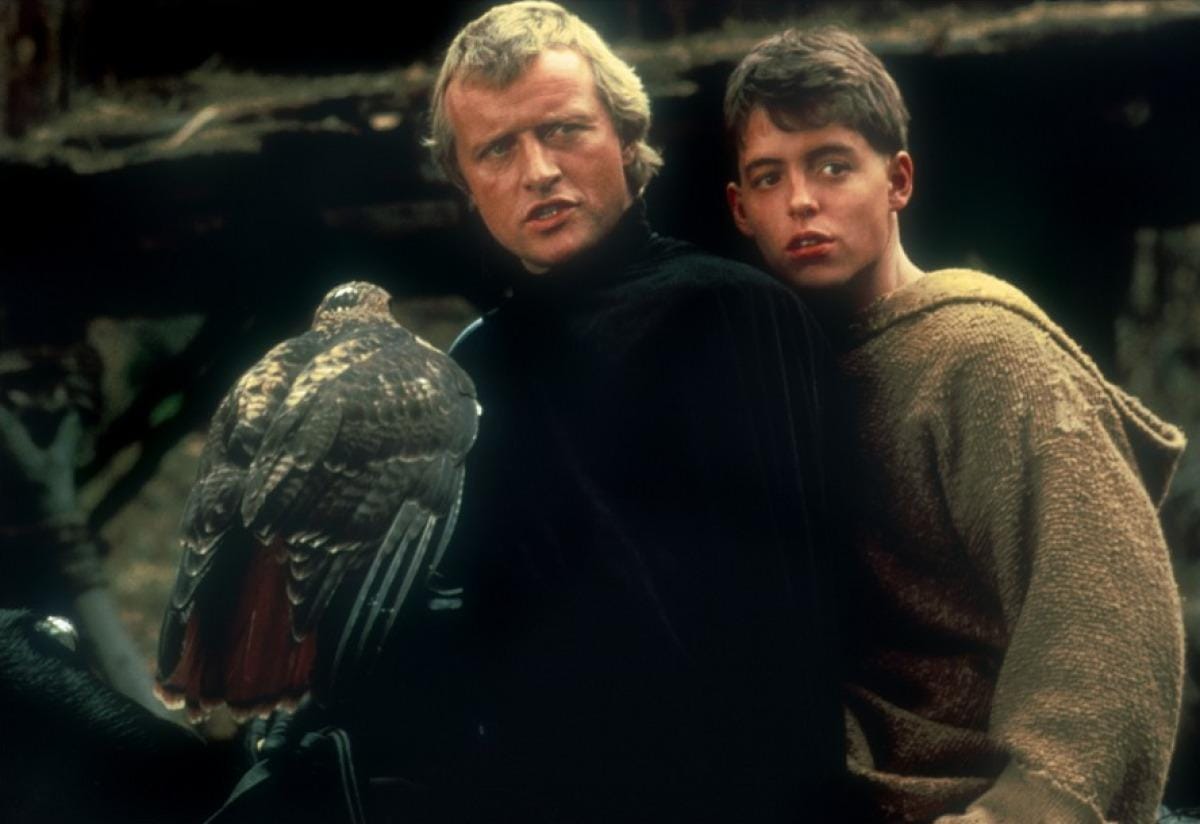A film score scholar defending... Ladyhawke?
An interview with film score scholar Timothy Greiving about his passion for soundtracks... including one of the most unpopular scores ever composed.

Ladyhawke turned 30 in April. I was all set to celebrate that anniversary, lonely Ladyhawke fan that I am.
But then things started going very wrong in my blog's last network home. And I just didn't feel much like hosting people for interviews there. So I took several months off, moved to this new place, and boom — now I get my Ladyhawke fix.
So here's the deal:
I received an unexpected package in the mail. It was from Timothy Greiving, a film score scholar whose thoughts on soundtracks I have long respected. Turns out Greiving knows my dark secret: I love — to an embarrassing degree — what may be the most maligned soundtrack in movie history. And, making me feel courageous enough to admit that, it turns out that he does too.
I still enjoy watching Ladyhawke now as much as I did then. In the wrong hands, it could have been a silly catastrophe. But director Richard Donner (Superman: The Movie) treated the material as seriously as if he were directing Shakespeare. The cinematography is glorious, full of iconic moments, including a star-making, moonlit moment when Michelle Pfeiffer makes a breathtaking entrance.
And I cannot say enough about what the cast brings to the material. Donner gambled by casting Matthew Broderick as a trouble-prone thief who carries on a one-sided conversation with God throughout. Broderick was a teen star at the time, riding a wave of popularity with two big hits: WarGames and Ferris Bueller’s Day Off. But it works because even though he’s the character who carries us all the way through, he’s not really the leading man. He’s the comic relief, which the film needs as a counter to the gravity of the rest of the cast. Rutger Hauer is in rare heroic form. Michelle Pfeiffer plays a beauty you’d believe knights would fight for. John Wood plays the villain—an imperious bishop with a satanic heart, helped by a sinister wolf-trapper played by Alfred Molina. And best of all, there’s the great Leo McKern in a show-stealing turn as a priest with a serious drinking problem.
But back to the soundtrack: Greiving, who writes about film scores for NPR, didn't just pick up a copy of the soundtrack for me. (I already have it.) No, he sent me La La Land Records’ new limited-edition 2-CD soundtrack.
When I listen to this music, my head fills with vivid images from a movie that ignited my 15-year-old imagination. What’s more, it’s an album that I asked my parents to play on the car stereo during road trips through Oregon, and much to my surprise, they came to like it—electric guitars and all. What’s more, I listened to Ladyhawke while I wrote stacks of fantasy novels in my late teens and on through college.
So I cannot give you an objective review—it’s all tangled up in experience.

Instead, let's consult the man himself, who wrote the liner notes for this release.
Please welcome Timothy Greiving.
•
Give us some background on your relationship with film soundtracks. Which were the first to grab your attention? How did you become a film music journalist?
Jurassic ParkStar WarsIndiana JonesJurassic Park
I began writing for the e-magazine Film Score Monthly Online in 2008 (for no pay), which let me in on a world where I could interview composers (eventually some of my idols) and write about the art form I loved more than any other. It was intoxicating, and eventually blossomed into paying work writing liner notes for specialty, archival soundtrack releases. I moved to Los Angeles in 2011 to get a master's in arts journalism, and have slowly built a career as a freelancer writing and producing radio stories for various outlets (NPR, Variety) almost entirely on the niche field of film music.
What are some of your favorites?
A.I.: Artificial IntelligenceA.I.E.T.SignsShadowlands
How much does the quality of the movie itself affect your opinion of the soundtrack?
The Final ConflictThe Shadow
You've just written the liner notes to a collector's edition double-disc soundtrack for the 1985 Richard Donner fantasy film Ladyhawke, which is a sentimental favorite of mine. It's hard for me to admit my love for that score because so many people rate it as one of the worst soundtracks ever composed.
You had to give Ladyhawke some serious attention to do the write-up that you did. How dod you feel about the soundtrack? And why do you think people have such strong feelings about it?
I never knew this film or its score until I was assigned to write the liner notes for this release, so it was a revelation to me. If I'd encountered it just a few years ago, it probably would have triggered my gag reflex, because I had such a strong distaste for ’80s film scores with heavy synth/rock flavors. But over the last two years or so I've completely fallen in love with the work of Kraftwerk, Tangerine Dream, Vangelis, Giorgio Moroder, etc. (everything I used to despise!), so Ladyhawke came along at a great time.
I'm still not a big fan of the film itself, but can appreciate its qualities.
You obviously put a lot of work into these Ladyhawke liner notes?
Ladyhawke
Have you had any interesting responses to this release? Is there a Ladyhawke soundtrack fan club out there that's going to snatch these up?
